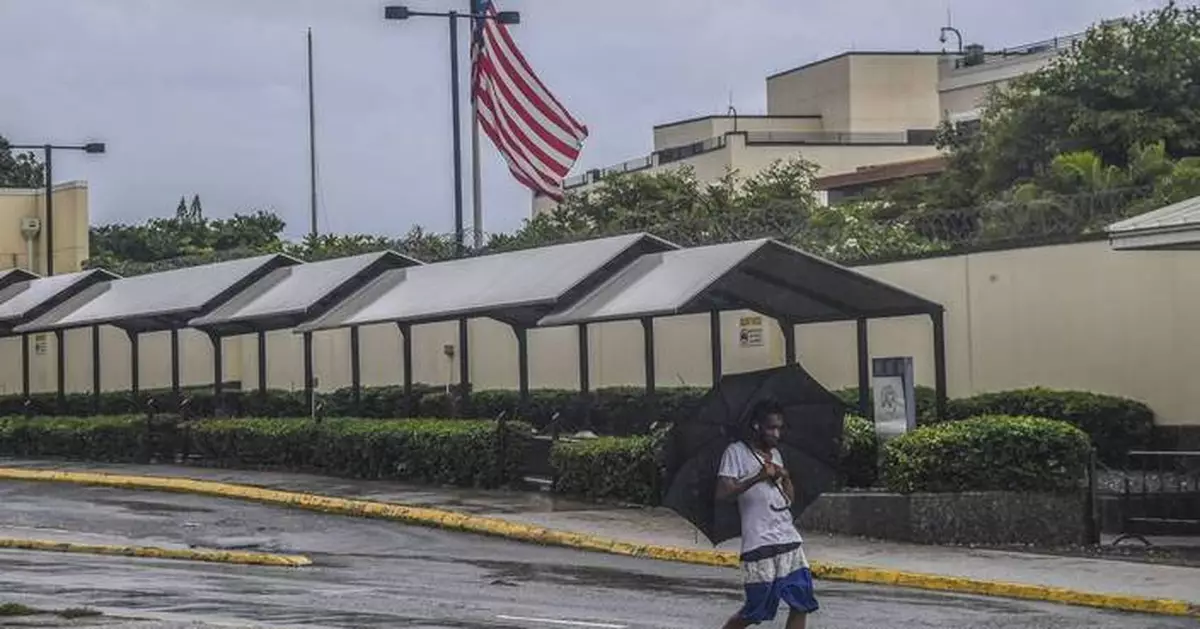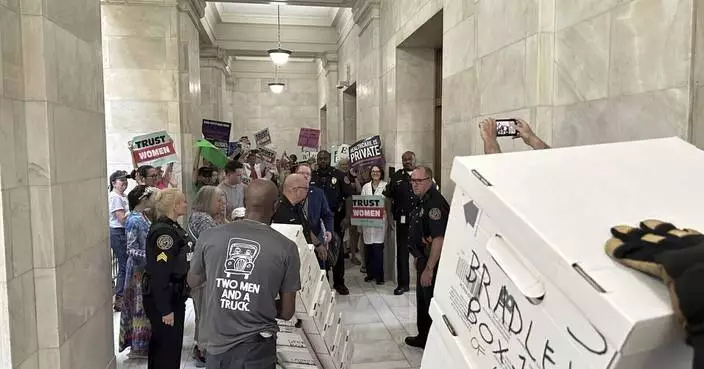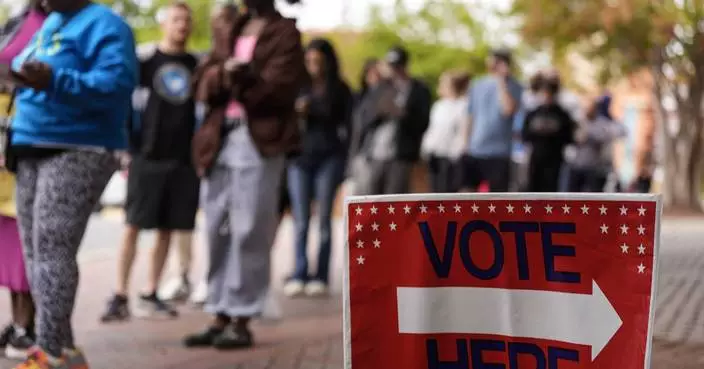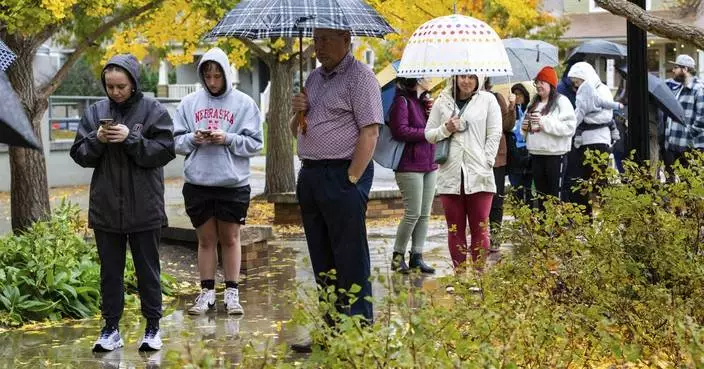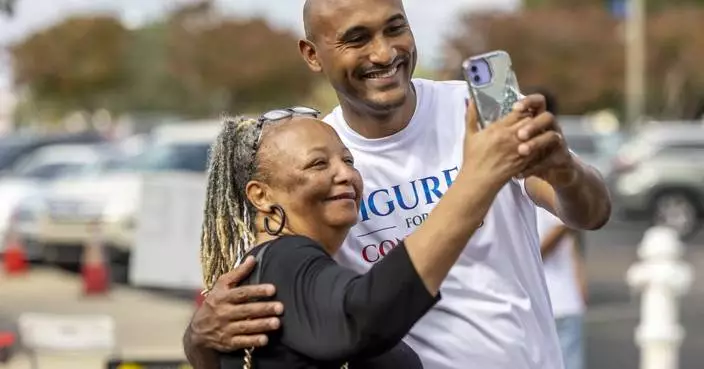SAN JUAN, Puerto Rico (AP) — Hurricane Rafael swirled past the Cayman Islands and was expected to rapidly intensify until making landfall on Wednesday in western Cuba, where it's forecast to hit as a Category 2 hurricane.
It was another stroke of bad news for Cuba, which has been struggling with blackouts while recovering from another hurricane two weeks ago that killed at least six people in the eastern part of the island.
The storm was located 65 miles (105 kilometers) north-northeast of Grand Cayman in the Cayman Islands on Wednesday morning. It had maximum sustained winds of 85 mph (140 kph) and was moving northwest at 13 mph (20 kph), according to the National Hurricane Center in Miami.
Forecasters warned that Rafael was expected to slam into Cuba on Wednesday after dumping rain on Jamaica and the Cayman Islands on Tuesday. The center warned of floods, storm surges and mudslides.
The U.S. State Department issued an advisory for Cuba on Tuesday afternoon, offering departure flights to non-essential staff and American citizens, and advising others to “reconsider travel to Cuba due to the potential impact of Tropical Storm Rafael.”
On Tuesday morning, the Cuban Civil Defense called on Cubans to prepare as soon as possible, because when the storm makes landfall “it’s important to stay where you are.” The day before, authorities said they had issued an evacuation order for 37,000 people in far eastern Cuba, in the province of Guantanamo, due to bad weather.
A hurricane warning was in effect Tuesday for the Cayman Islands and the Cuban provinces of Pinar del Rio, Artemisa, La Habana, Mayabeque, Matanzas and the Isle of Youth.
A tropical storm warning was in effect for the Cuban provinces of Villa Clara, Cienfuegos, Sancti Spiritus and Ciego de Avila, as well as the lower and middle Florida Keys from Key West to west of the Channel 5 Bridge, and Dry Tortugas. The warning was lifted in Jamaica after the storm passed by the western coast. A tropical storm watch was in effect for the Cuban provinces of Camaguey and Las Tunas.
Officials in the Cayman Islands closed schools and government offices as they urged residents to prepare. Long lines were reported at grocery stores as the storm approached.
Forecasters warned Rafael would unleash heavy rains across the western Caribbean that could lead to flooding and mudslides in parts of Cuba and the Cayman Islands.
Heavy rainfall also was expected to spread north into Florida and nearby areas of the southeast U.S. during the middle to late part of the week. The Hurricane Center predicted storm surges in Florida could reach 1 to 3 feet in Dry Tortugas and 1 to 2 feet in the Lower Florida Keys. A few tornadoes also were expected Wednesday over the Keys and southwestern Florida.
Rafael is the 17th named storm of the season.
The National Oceanic and Atmospheric Administration predicted the 2024 hurricane season was likely to be well above average, with between 17 and 25 named storms. The forecast called for as many as 13 hurricanes and four major hurricanes.
An average Atlantic hurricane season produces 14 named storms, seven of them hurricanes and three major hurricanes.
Follow AP’s coverage of Latin America and the Caribbean at https://apnews.com/hub/latin-america
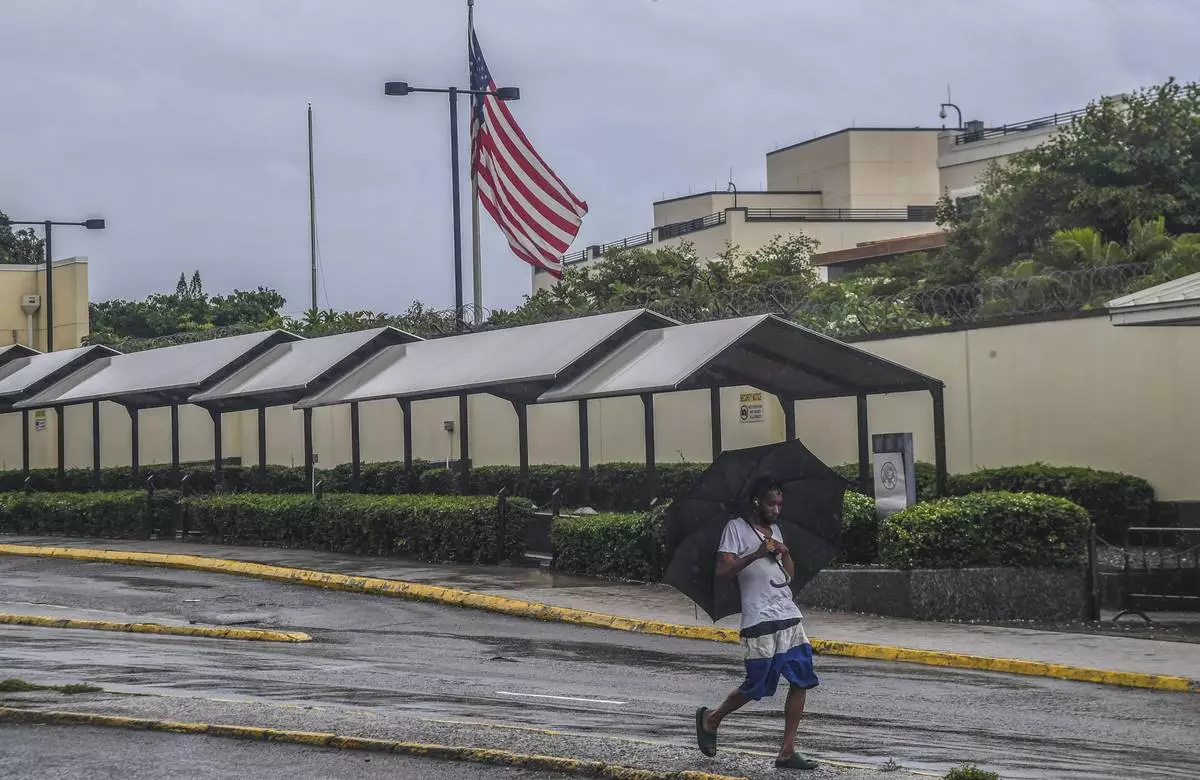
A man walks past the the U.S. Embassy during rains brought on by tropical storm Rafael in Kingston, Jamaica, Tuesday, Nov. 5, 2024. (AP Photo/Collin Reid)
A costly campaign to legalize recreational marijuana in Florida failed Tuesday and California voters took a step toward tough crime laws as voters in dozens of states weighed more than 140 measures appearing on the ballot alongside races for president and top state offices.
Florida was one of several states deciding high-profile marijuana measures and was among 10 states considering amendments related to abortion or reproductive rights. Voters in several states gave resounding approval to amendments specifically barring noncitizens from voting.
Other state measures affected wages, taxes and education, including a school choice measure that was defeated in Kentucky.
Many of the ballot measures were initiated by citizen petitions that sidestep state legislatures, though others were placed before voters by lawmakers.
The Florida marijuana amendment fell short of the 60% supermajority needed to approve constitutional amendments. It would have allowed recreational sales of marijuana to people over 21 from existing medical marijuana dispensaries, with the potential for the Legislature to license additional retailers.
The campaign was funded predominantly by Florida’s largest medical marijuana operator, Trulieve, which had provided almost $145 million of the $153 million campaign through the end of October. The measure was opposed by the Florida Republican Party and Gov. Ron DeSantis, who said it would reduce the quality of life by leaving a marijuana stench in the air.
Measures to legalize recreational marijuana also were trailing in North Dakota and South Dakota. The election marks the third vote on the issue in both states.
In Nebraska, voters approved a pair of measures to legalize medical marijuana and regulate the industry.
Heading into the election, 24 states and the District of Columbia — representing 53% of the nation’s population — already had legalized marijuana for adults. A total of 38 states and the District of Columbia had laws allowing the medical use of marijuana. Possessing or selling marijuana remains a crime under federal law, punishable by prison time and fines.
In Massachusetts, voters were weighing a ballot measure that would legalize the possession and supervised use of natural psychedelics, including psilocybin mushrooms. It would be the third state to do so, following Oregon and Colorado.
Constitutional amendments declaring that only citizens can vote won approval in Iowa, Kentucky, Missouri, North Carolina, Oklahoma, South Carolina and Wisconsin. A similar measure also was being considered in Idaho. All the measures were referred to the ballot by Republican-led legislatures.
A 1996 U.S. law prohibits noncitizens from voting in federal elections, and many states already have similar laws. But Republicans have emphasized the potential of noncitizens voting after an influx of immigrants at the U.S.-Mexican border. Though noncitizen voting historically has been rare, voter roll reviews before the election flagged potential noncitizens registered in several states.
Some municipalities in California, Maryland, Vermont and Washington, D.C., allow noncitizens to vote in certain local elections.
Voters in California took a step toward tougher crime laws, a decade after relaxing them. A measure approved Tuesday makes shoplifting a felony for repeat offenders again and increasing penalties for some drug charges, including those involving the synthetic opioid fentanyl. It also gives judges the authority to order people with multiple drug charges to get treatment.
The measure partly rolls back a law passed by voters in 2014 that downgraded several nonviolent crimes to misdemeanors, including theft under $950 in value and some drug offenses.
Voters in Washington state upheld a climate-change law seeking to slash carbon pollution. Tuesday’s vote defeated an attempt to repeal a 2021 state law that caps carbon emissions and requires major polluters to pay for the right to do so by buying “allowances.” Washington was the second state to launch such a program, after California.
In Colorado, where sports betting launched in 2020, voters approved a measure allowing the state to keep more than the original $29 million limit on sports betting tax revenue.
Missouri voters, meanwhile, are deciding whether to become the latest to legalize sports betting. A total of 38 states and Washington, D.C., already allow sports betting, which has expanded rapidly since the U.S. Supreme Court cleared the way for it in 2018.
In Ohio, voters defeated an initiative that would have created a 15-member citizens commission to handle redistricting for U.S. House and state legislative seats and required the share of districts favoring each political party to reflect the proportion of votes won in previous statewide elections.
Ohio’s districts were created after the 2020 census by a Republican-led commission of elected state officials and were repeatedly deemed by courts to be be unconstitutionally gerrymandered to favor Republicans.
Supporters of the defeated constitutional amendment asserted that it would “ban partisan gerrymandering.” But the ballot title presented to voters — approved by a Republican-led board — stated it would have done the opposite via a commission “required to gerrymander” districts to favor political parties.
North Dakota voters defeated a proposal that would have eliminated most property taxes. A legislative panel estimated it could have cost the state over $3 billion biennially — about half the amount of the state’s two-year general fund budget passed last year.
In Oregon, voters defeated a measure that would have raised the minimum tax on large corporations to fund a tax rebate for residents.
South Dakota voters defeated a proposed repeal of the state’s sales tax on groceries.
In Colorado, voters are weighing a proposal that would make it the second state after California to impose a sales tax on firearms and ammunition, with revenue going primarily to crime victims’ services. The federal government already taxes sales of guns and ammunition.
Connecticut voters passed a measure authorizing no-excuse absentee voting, joining most states that already allow it.
Ranked choice voting received mixed results from voters. A measure allowing ranked choice voting passed in Washington, D.C. But in Oregon, voters defeated a measure that would have required ranked choice voting in both primaries and general elections. And Missouri approved a measure banning ranked choice voting.
Ranked choice voting is currently used in Alaska and Maine. But Alaska voters also are considering whether to repeal provisions of a 2020 initiative that instituted open primaries and ranked choice general elections.
Nevada voters defeated a proposal to use open primaries featuring candidates from all parties, with a certain number advancing to a general election using ranked choice voting. Similar measures were being considered in Colorado and Idaho.
In South Dakota, voters defeated a measure to create open primary elections in which candidates of all parties appear on the same ballot, with a certain number advancing to the general election. A similar measure is on the Montana ballot.
Arizona voters are deciding between competing ballot proposals that would require either open primaries with candidates of all parties or the state’s current method of partisan primaries. If conflicting measures both pass, the provision receiving the most votes takes effect, but that could be up to a court to decide.
Voters in Arizona rejected a measure that would have let tipped workers be paid 25% less than the minimum wage, so long as tips pushed their total pay beyond the minimum wage threshold. In Massachusetts, voters defeated a measure that would have gradually raised the minimum wage for tipped employees until it matches the rate for other employees.
Elsewhere, ballot measures in Missouri and Alaska would gradually raise minimum wages to $15 an hour while also requiring paid sick leave. A California measure would incrementally raise the minimum wage for all employers to $18 an hour.
Nebraska voters approved a measure to require many employers to provide sick leave, but it would not change wages.
An Arizona measure crafted amid a surge in immigration would make it a state crime to enter from a foreign country except through official ports of entry, and for someone already in the U.S. illegally to apply for public benefits using false documents.
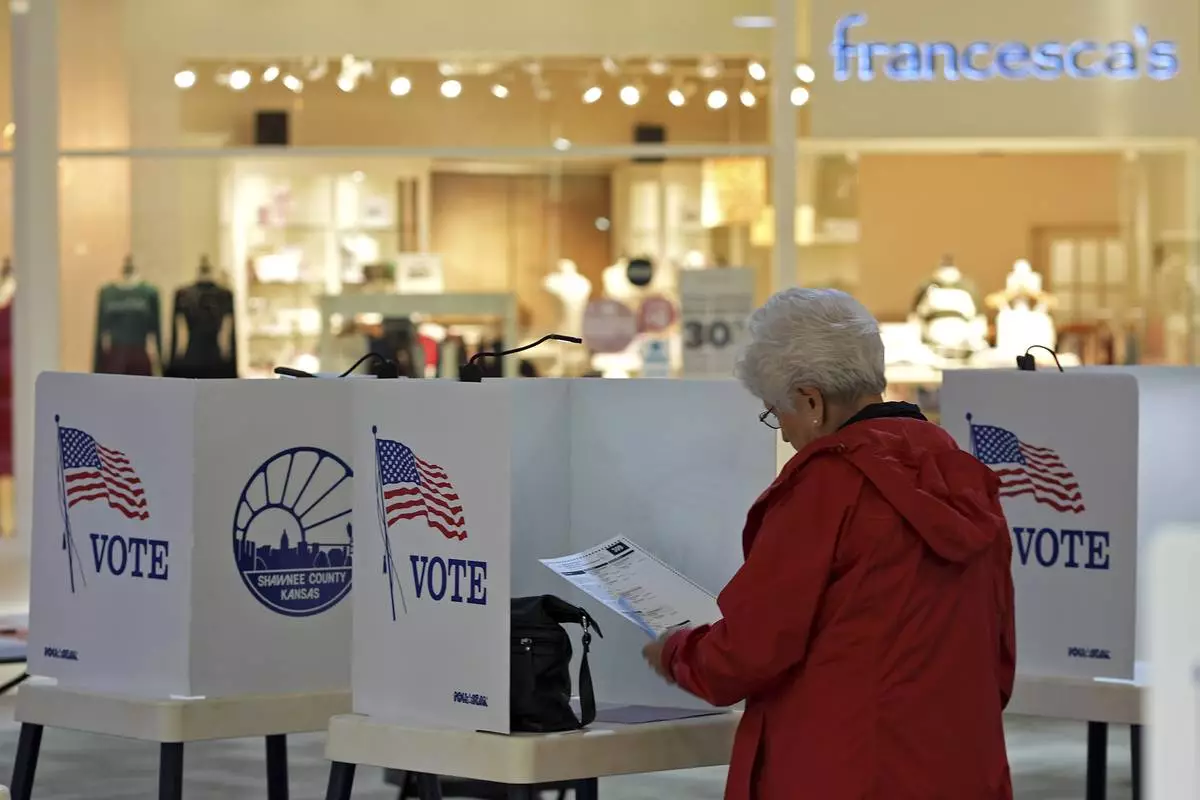
Delores Engel looks over her ballot while voting at the West Ridge Mall Tuesday, Nov. 5, 2024, in Topeka, Kan. (AP Photo/Charlie Riedel)
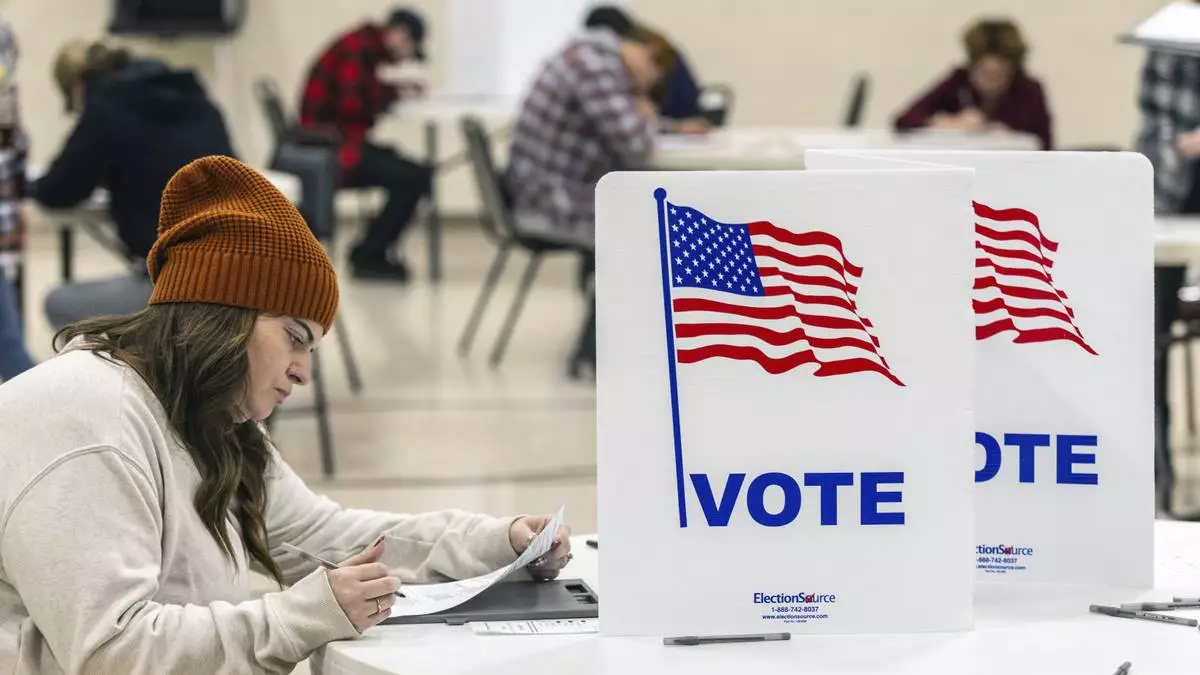
Kortney Test fills out her ballot at Celebration Covenant Church in Omaha, Neb., on Election Day, Tuesday, Nov. 5, 2024. (Chris Machian/Omaha World-Herald via AP)
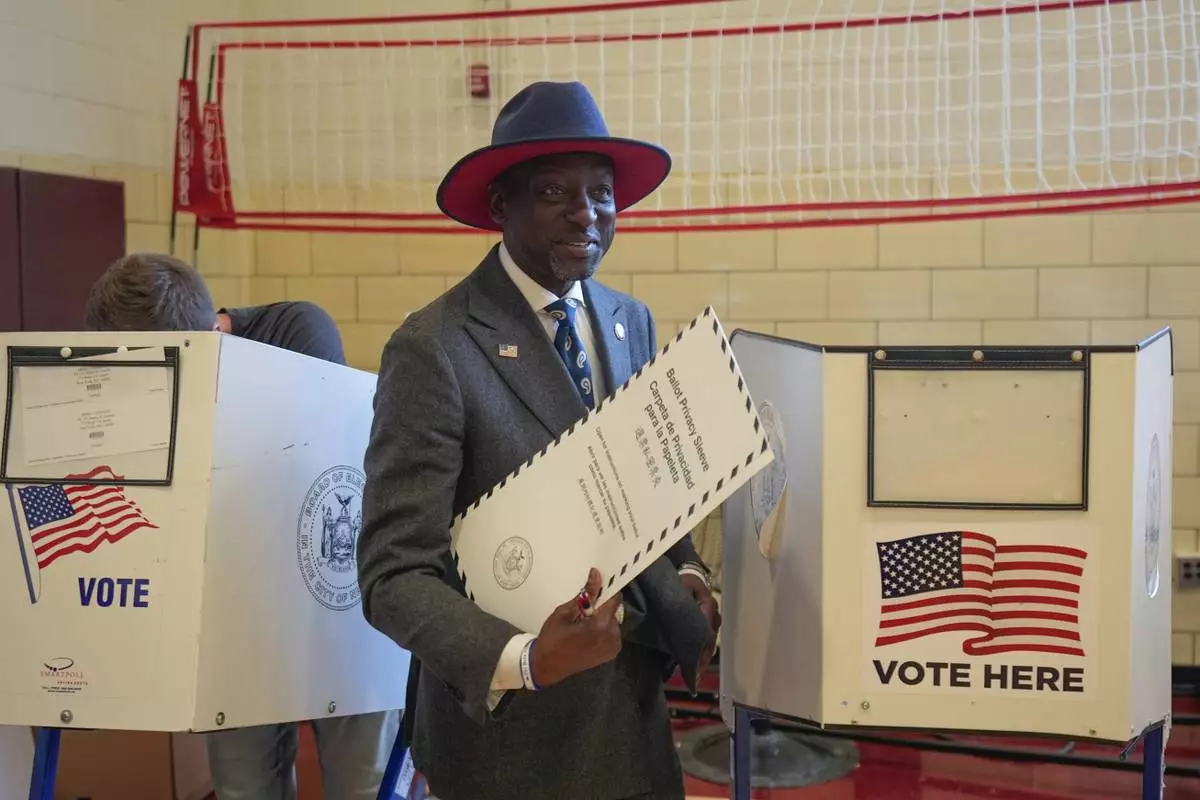
Yusef Salaam, New York City Council member and a member of 'The Exonerated Five', votes at the P.S. 175 Henry Highland Garnet school on Election Day, Tuesday, Nov. 5, 2024, in New York. (AP Photo/Frank Franklin II)
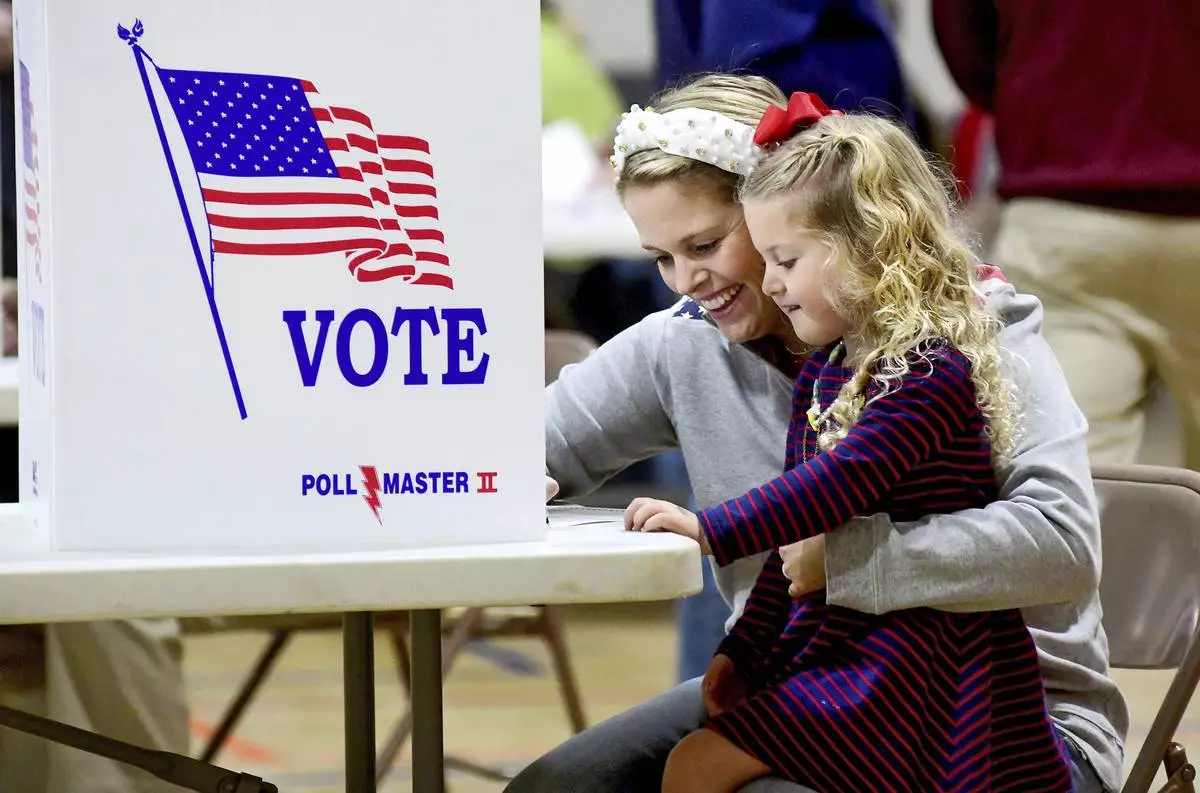
Kate Aurandt-Gribbler holds her daughter, Olivia Gribbler, 3, as she votes at the Westmont Borough No. 1 polling place at Westmont Grove in Johnstown, Pa., in Cambria County, on Tuesday, Nov. 5, 2024. (Thomas Slusser/The Tribune-Democrat via AP)



